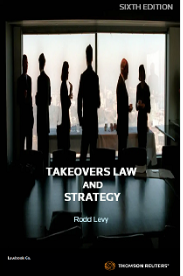
14 Nov 2022
Insight
Australia
A new edition of Takeovers Law & Strategy is due to be released this month. Since the last edition was released in 2017, there have been 130 decisions made by the Takeovers Panel, revised guidance notes, new foreign investment rules and other developments.
The book takes account of these and includes extensive commentary on practical issues that arise in conducting or responding to a takeover proposal.
IN BRIEF
- The 6th Edition of Takeovers Law & Strategy, written by HSF partner Rodd Levy, is set to be released in November.
- The new edition considers numerous legal developments since the last edition in 2017 and contains insights on strategy and practice from one of Australia’s most senior M&A lawyers.

TAKEOVERS LAW & STRATEGY - NEW EDITION
I am very pleased to announce that a new edition of Takeovers Law & Strategy is due in November.
The book takes account of developments since the last edition in 2017. This includes 130 decisions made by the Takeovers Panel, revised guidance notes, new foreign investment rules and other developments. In addition, the new book includes detailed commentary on practical issues that arise in conducting or responding to a takeover bid.
I hope the new edition will assist company directors, bidders and others involved in takeover proposals to understand the law and practice.
Writing the new edition has caused me to reflect on changes to market practice since I first started work on the text of the book in 1989. Two developments stand out.

The first is the rise of schemes of arrangement to effect a change of control of a public company. Once regarded as lumbering and cumbersome, their ability to bring things to a head by a certain date, and with far fewer opportunities for shareholders to hold out compared to a takeover bid, has delivered tangible benefits for Australia’s market for corporate control. The certainty that the process delivers facilitates equity and debt financing. This has improved liquidity for target shareholders.
I have suggested that we build on this success by introducing a new transaction format that combines the best of the schemes and takeover regimes. This would involve a board recommendation, an expert’s report and a 75% vote by independent shareholders, but court supervision would not be required. The Panel would decide any disputes.
Allowing a transaction to proceed with a 75% vote without giving the courts the final say is consistent with the modern approach that accepts the primary function of corporate regulation is to promote the efficient allocation of resources in the economy. The ability of a small rump of minority shareholders to disrupt that goal should be curtailed.
The second major development over the last 30 years has been the emergence of the Takeovers Panel and the influential role it plays in transactions which affect corporate control. Originally devised as a peer review body to resolve takeover disputes in place of the courts, the Panel has become much more than that. It is the standard setter with broad jurisdiction to consider whether anything done in connection with a control transaction is unacceptable.
Issues that would never have come before a court previously now regularly come to the Panel for review. And the Panel has been enthusiastic in hearing matters and providing guidance and setting new standards. It is not going too far to say that the importance of the detailed takeover rules in Chapter 6 of the Corporations Act has been eclipsed by the Panel’s guidance on a plethora of issues.
ACKNOWLEDGEMENTS
In producing the new book, I have had enormous assistance from George Durbridge, the former general counsel of ASIC and the Takeovers Panel. George’s diligence and deep thought have raised the scholarship in the book to a level that I could not have attained on my own. Thank you, George.
I would also like to than other HSF lawyers who have helped, including Toby Eggleston, Sarah Benbow, Jinny Chaimungkalanont, Simon Walker and Mariia Artemenko. Thank you, all.
To purchase a copy of the book, you can place an order by clicking the below button.
Legal Notice
The contents of this publication are for reference purposes only and may not be current as at the date of accessing this publication. They do not constitute legal advice and should not be relied upon as such. Specific legal advice about your specific circumstances should always be sought separately before taking any action based on this publication.
© Herbert Smith Freehills 2025
Stay in the know
We’ll send you the latest insights and briefings tailored to your needs

